13th Asia Pacific Transportation Development Conference
A Comprehensive Traffic Ecological Performance Index Based on Individual Car and Bus Travel Speed in Urban Road Network
Publication: Resilience and Sustainable Transportation Systems
ABSTRACT
The scientific and comprehensive measurements of effectiveness (MOE) is very important to validate the traffic improvement programs for local governments and traffic engineers, such as traffic design, signal control, route guidance. Most previous studies only focused on single indexes (travel delay, speed, the number of stops, throughput, etc.) and homogenous weighted multi-indexes (delay and number of stops), which could not represent the different-level evaluation objective, such as time-consuming cost, environment cost, fuel-consuming cost. Therefore, this study investigated individual vehicle data from floating cars and buses in urban road network under internet of vehicles (IOV), and proposed a new comprehensive traffic ecological performance index (TECOPI) with considering the ecological environment by travel speed, emissions, and fuel consumption. In tests that used field intersection from the central district of Nanchang, China, the proposed TECOPI can reflect the fluctuation tendency of traffic performance under different signal timings. The sensitivity analysis showed that the TECOPI can outperform the exiting single index.
Get full access to this article
View all available purchase options and get full access to this chapter.
REFERENCES
Ahn, K. (1998). “Microscopic fuel consumption and emission modeling.” Virginia Polytechnic Institute and State University, Blacksburg.
Argonne National Laboratory (2006). “Powertrain System Analysis Toolkit(PSAT): A Flexible; Reusable Model for Simulating Advanced Vehicles.”
Chau, K. T., Wong, Y.S., and Chan, C. C. (2000). “EVSIM-A PC-based simulation tool for an electric vehicle technology course.” International Journal of Electrical Engineering Education, 37(2), 167-179.
Cottrell, W. D. (1991). Measurement of the extent and duration of freeway congestion in urbanized areas. In Institute of Transportation Engineers Meeting.
EEA (2000). “COPERT HI Computer program to calculate emissions from road transport Methodology and emission factors (Version 2.1).”. Copenhagen, EEA.
He, F. F., Yan, X and Liu, Y. (2016). “A traffic congestion assessment method for urban road networks based on speed performance index.” Procedia engineering, 137, 425-433.
Jeffreys, I., Graves, G., and Roth, M. (2018). “Evaluation of eco-driving training for vehicle fuel use and emission reduction: A case study in Australia.” Transportation Research Part D: Transport and Environment, 60, 85-91.
Jiang, H., Hu, J., An, S., Wang, M., and Park, B. B. (2017). “Eco approaching at an isolated signalized intersection under partially connected and automated vehicles environment.” Transportation Research Part C: Emerging Technologies, 79, 290-307.
Jimdnez, P. J. (1999). “Understanding and Quantifying Motor Vehicle Emissions with Vehicle Specific Power and TILDAS Remote Sensing.” Cambridge: Massachusetts Institute of Technology.
Joumard, R., Hickman, A. J., Nemerlin, J., and Hassel, D. (1992). Modelling of emissions and consumption in urban areas-final report. DRIVE project, 1053.
Jun, J. M. and Pei, Y. L. (2012). “Ecological Index and Its Calculation Method for Urban Passenger Transportation Modes.” Urban Transport of China, 10(5), 13 and 74-77. (In Chinese)
Kesur, K. B. (2013). “Multi-objective Optimization of Delay and Stops in Traffic Signal Networks.” Metaheuristics in Water, Geotechnical and Transport Engineering, 385-416.
Koupal, J., Michaels, H., Cumberworth, M., Bailey, C., and Brzezinski, D. (2002). “EPA’S plan for moves: A comprehensive mobile source emissions model.” In: Proceedings of the 12th CRC On-Road Vehicle Emissions Workshop, San Diego, CA.
Kwak, J., Park, B., and Lee, J. (2012). “Evaluating the impacts of urban corridor traffic signal optimization on vehicle emissions and fuel consumption.” Transportation Planning and Technology, 35(2): 145-160.
Liu, Y., Wang, Y., Li, D., Feng, F., Yu, Q., and Xue, S. (2019). “Identification of the potential for carbon dioxide emissions reduction from highway maintenance projects using life cycle assessment: A case in China.” Journal of Cleaner Production, 219, 743-752.
Michwel, B. (2005). “Special Issue Introduction: Transport Fuel Use and Sustainability.” Transport Reviews, 25(6), 643-645.
Scora, G., and Barth, M. (2006). “Comprehensive modal emissions model (CMEM), version 3.01, User’s Guide.” Centre for Environmental Research and Technology. University of California, Riverside.
Shafie, P. M., Tavakoli, A. (2013). “On-Road Vehicle Emissions Forecast Using IVE Simulation Model.” International Journal of Environmental Research, 7(2): 367-376.
Thurgood, G. S. (1995). “Development of Freeway Congestion Index Using an Instrumented Vehicle.” Transportation Research Board, National Research Council, Washington, D.C., 1494, 21-29.
Wipke, K. B., Cuddy, M. R. and Burch, S. D. (1999). “Advisor 2.1: A user-friendly advanced powertrain simulation using a combined backward/forward approach.” IEEE Transactions on Vehicular Technology, 48(6), 1751-1761.
Xiang, J., Tang, K., and Tao, J. J. (2017). “Impacts of Cycle Length and Volume on Traffic Emissions and Delay at Signalized Intersections.” Journal of Tongji University, 45(11), 1629-1639. (In Chinese)
Yang, Z., Qu, X., Lin, C., Bing, Q., and Gong, B. (2015). “Traffic Signal Optimization Method Considering Low Emissions and Short Delay.” Journal of South China University of Technology (Natural Science), 43(10), 29-34 and 41. (In Chinese)
Information & Authors
Information
Published In
Resilience and Sustainable Transportation Systems
Pages: 666 - 672
Editors: Fengxiang Qiao, Ph.D., Texas Southern University, Yong Bai, Ph.D., Marquette University, Pei-Sung Lin, Ph.D., University of South Florida, Steven I Jy Chien, Ph.D., New Jersey Institute of Technology, Yongping Zhang, Ph.D., California State Polytechnic University, and Lin Zhu, Ph.D., Shanghai University of Engineering Science
ISBN (Online): 978-0-7844-8290-2
Copyright
© 2020 American Society of Civil Engineers.
History
Published online: Jun 29, 2020
Published in print: Jun 29, 2020
Authors
Metrics & Citations
Metrics
Citations
Download citation
If you have the appropriate software installed, you can download article citation data to the citation manager of your choice. Simply select your manager software from the list below and click Download.
